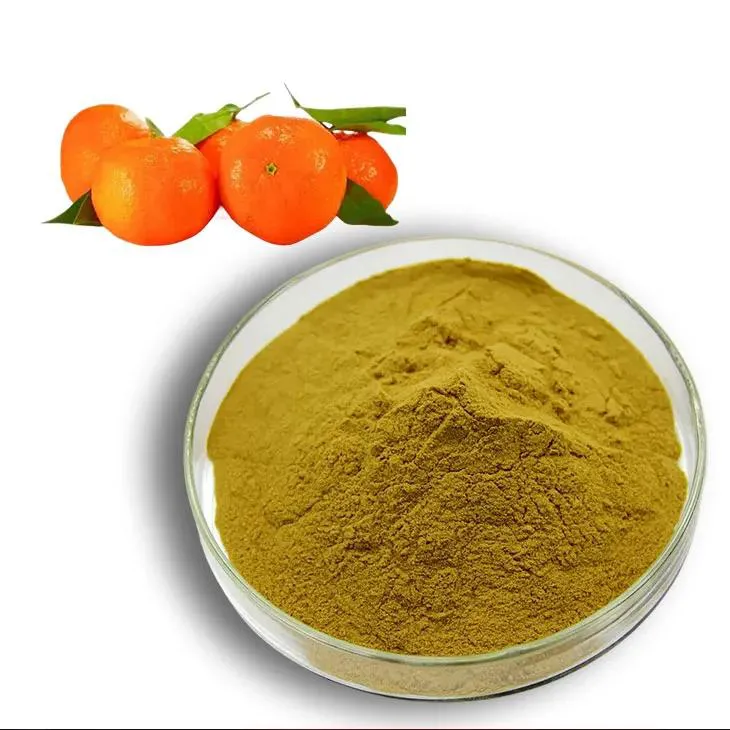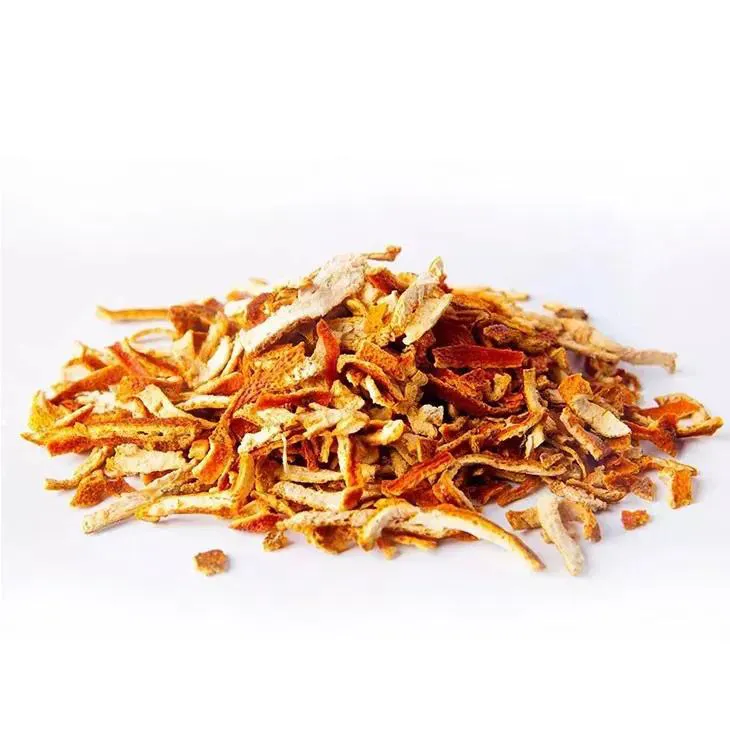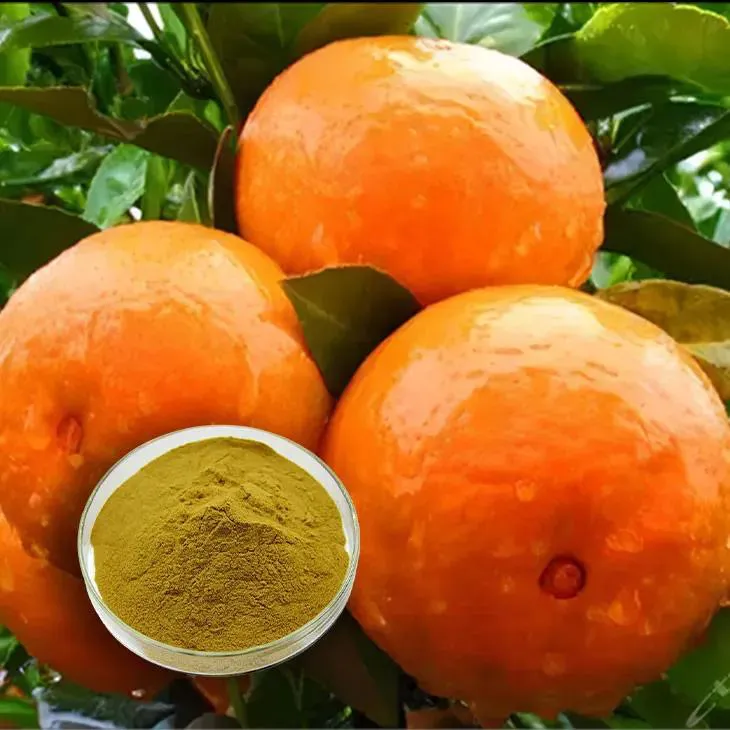- 0086-571-85302990
- sales@greenskybio.com
Regarding Citrus Bioflavonoids: The Antioxidant Companion from Natural Citrus.
2024-12-10

Introduction
Citrus fruits have long been cherished for their refreshing taste and high nutritional value. Among the many beneficial components in citrus fruits, citrus bioflavonoids stand out as remarkable substances with a wide range of health - promoting properties. These bioflavonoids are found in abundance in popular citrus fruits such as oranges, lemons, and grapefruits. Their presence not only adds to the flavor and color of these fruits but also plays a crucial role in maintaining and enhancing human health.

What are Citrus Bioflavonoids?
Citrus bioflavonoids are a group of polyphenolic compounds that occur naturally in citrus fruits. They are secondary metabolites and are often found in the peel, pulp, and white pith of the fruits. There are several types of citrus bioflavonoids, including Hesperidin, naringin, and Quercetin, each with its own unique chemical structure and properties.
These bioflavonoids are synthesized by the plants as a part of their defense mechanism against environmental stresses such as UV radiation and pathogen attacks. However, when consumed as part of a diet, they offer numerous benefits to the human body.

Antioxidant Properties
One of the most significant aspects of citrus bioflavonoids is their role as powerful antioxidants. In the human body, normal metabolic processes generate free radicals, which are highly reactive molecules with unpaired electrons. These free radicals can cause damage to cells, proteins, and DNA through a process known as oxidative stress.
Citrus bioflavonoids combat free radicals in several ways. Firstly, they can directly scavenge free radicals, neutralizing their reactivity. For example, Hesperidin has been shown to effectively react with and neutralize superoxide anions and hydroxyl radicals. Secondly, they can enhance the activity of the body's endogenous antioxidant enzymes, such as superoxide dismutase (SOD), catalase, and glutathione peroxidase. These enzymes play a crucial role in the body's antioxidant defense system by breaking down free radicals into less harmful substances.
The antioxidant activity of citrus bioflavonoids is crucial in preventing various chronic diseases. Oxidative stress is implicated in the development of many diseases, including heart disease, cancer, neurodegenerative diseases, and diabetes. By reducing oxidative stress, citrus bioflavonoids can help protect cells from damage and reduce the risk of these diseases.

Anti - Inflammatory Effects
In addition to their antioxidant properties, citrus bioflavonoids also possess anti - inflammatory properties. Inflammation is a natural immune response of the body to injury or infection. However, chronic inflammation can lead to a host of health problems, including autoimmune diseases, arthritis, and cardiovascular diseases.
Citrus bioflavonoids can modulate the inflammatory response at multiple levels. They can inhibit the production of pro - inflammatory cytokines, such as interleukin - 1β (IL - 1β) and tumor necrosis factor - α (TNF - α). These cytokines are key mediators of the inflammatory process and are often overproduced in chronic inflammatory conditions.
For example, naringin has been shown to reduce inflammation in animal models of arthritis by suppressing the production of pro - inflammatory cytokines. Additionally, citrus bioflavonoids can also inhibit the activation of nuclear factor - κB (NF - κB), a transcription factor that regulates the expression of many pro - inflammatory genes. By inhibiting NF - κB activation, citrus bioflavonoids can further reduce the inflammatory response.
The anti - inflammatory effects of citrus bioflavonoids can be beneficial in alleviating symptoms in various inflammatory conditions. For individuals suffering from arthritis, consuming citrus bioflavonoids - rich foods or supplements may help reduce joint pain and swelling. In addition, they may also be beneficial in reducing inflammation in the cardiovascular system, potentially lowering the risk of heart disease.
Improvement of Blood Circulation
Citrus bioflavonoids also contribute to improved blood circulation. They can have a positive impact on the vascular system in several ways.
One way is by enhancing the function of endothelial cells, which line the inside of blood vessels. Endothelial cells play a crucial role in maintaining vascular homeostasis by regulating blood vessel dilation and constriction, as well as preventing blood clot formation. Citrus bioflavonoids can improve endothelial function by increasing the production of nitric oxide (NO). NO is a vasodilator, which means it relaxes blood vessels, allowing for better blood flow.
For example, Hesperidin has been shown to improve endothelial - dependent vasodilation in both animal and human studies. Another way in which citrus bioflavonoids can improve blood circulation is by reducing blood viscosity. High blood viscosity can impede blood flow and increase the risk of thrombosis. Citrus bioflavonoids can help reduce blood viscosity by inhibiting platelet aggregation.
Platelets are small cell fragments in the blood that play a key role in blood clotting. When platelets aggregate excessively, they can form blood clots, which can block blood vessels and lead to serious health problems such as heart attacks and strokes. By inhibiting platelet aggregation, citrus bioflavonoids can help maintain normal blood flow and reduce the risk of thrombosis.
Enhancement of the Immune System
The immune system is the body's defense against foreign invaders such as bacteria, viruses, and parasites. Citrus bioflavonoids can play a role in enhancing the immune system.
They can modulate the immune response by influencing the activity of immune cells. For example, citrus bioflavonoids can enhance the function of macrophages, which are immune cells that engulf and destroy foreign invaders. Macrophages play a crucial role in the innate immune response by recognizing and eliminating pathogens.
Citrus bioflavonoids can also stimulate the production of antibodies by B lymphocytes. Antibodies are proteins that bind to specific antigens on the surface of foreign invaders, marking them for destruction by other immune cells. By enhancing antibody production, citrus bioflavonoids can help the body mount a more effective immune response against infections.
In addition, citrus bioflavonoids can have a prebiotic - like effect, promoting the growth of beneficial gut bacteria. The gut microbiota plays an important role in the immune system, as it can influence the development and function of immune cells. By promoting the growth of beneficial gut bacteria, citrus bioflavonoids can indirectly enhance the immune system.
Incorporating Citrus Bioflavonoids into the Diet
Given the numerous health benefits of citrus bioflavonoids, it is important to incorporate them into the diet. One of the easiest ways to obtain citrus bioflavonoids is by consuming whole citrus fruits. Oranges, lemons, and grapefruits are all excellent sources of these bioflavonoids.
When consuming citrus fruits, it is beneficial to include the peel and white pith, as these parts contain a higher concentration of bioflavonoids. However, it should be noted that the peel may be contaminated with pesticides, so it is advisable to choose organic citrus fruits when possible.
Citrus juices can also be a source of bioflavonoids, although the processing may reduce the concentration of these compounds compared to whole fruits. Additionally, there are also citrus bioflavonoid supplements available on the market. However, it is important to consult a healthcare professional before starting any supplement regimen, as high doses of supplements may have potential side effects.
Conclusion
Citrus bioflavonoids, the antioxidant companions from natural citrus fruits, offer a wide range of health benefits. Their antioxidant, anti - inflammatory, blood - circulation - improving, and immune - enhancing properties make them valuable components of a healthy diet. Incorporating citrus fruits into the diet, either as whole fruits or in the form of juices, is an easy and natural way to obtain these beneficial bioflavonoids. For those who may have difficulty consuming enough citrus fruits, supplements may be an option, but should be used with caution under the guidance of a healthcare professional. With their natural origin and multiple health - promoting effects, citrus bioflavonoids have the potential to play an important role in maintaining and improving human health.
FAQ:
What are citrus bioflavonoids?
Citrus bioflavonoids are compounds that are found abundantly in citrus fruits such as oranges, lemons, and grapefruits. They are known for their antioxidant and other beneficial properties.
How do citrus bioflavonoids act as antioxidants?
Citrus bioflavonoids combat free radicals in the body. Free radicals are unstable molecules that can cause oxidative stress. By neutralizing these free radicals, citrus bioflavonoids reduce oxidative stress, which is beneficial for overall health and can help prevent chronic diseases.
What chronic diseases can citrus bioflavonoids help prevent?
Citrus bioflavonoids can help prevent chronic diseases such as heart disease and certain cancers. Their antioxidant and anti - inflammatory properties contribute to this preventive effect.
How do citrus bioflavonoids show anti - inflammatory properties?
Citrus bioflavonoids can alleviate symptoms in inflammatory conditions. They work by reducing inflammation in the body at a cellular level, though the exact mechanisms are still being studied.
How can citrus bioflavonoids improve blood circulation?
While the exact mechanisms are not fully understood, citrus bioflavonoids may help relax blood vessels or interact with components in the blood that are related to circulation, thus contributing to improved blood circulation.
Related literature
- The Role of Citrus Bioflavonoids in Health and Disease"
- "Citrus Bioflavonoids: A Review of Their Antioxidant and Therapeutic Properties"
- "Bioflavonoids from Citrus Fruits: Potential Benefits for Human Health"
- ▶ Hesperidin
- ▶ Citrus Bioflavonoids
- ▶ Plant Extract
- ▶ lycopene
- ▶ Diosmin
- ▶ Grape seed extract
- ▶ Sea buckthorn Juice Powder
- ▶ Fruit Juice Powder
- ▶ Hops Extract
- ▶ Artichoke Extract
- ▶ Mushroom extract
- ▶ Astaxanthin
- ▶ Green Tea Extract
- ▶ Curcumin
- ▶ Horse Chestnut Extract
- ▶ Other Product
- ▶ Boswellia Serrata Extract
- ▶ Resveratrol
- ▶ Marigold Extract
- ▶ Grape Leaf Extract
- ▶ New Product
- ▶ Aminolevulinic acid
- ▶ Cranberry Extract
- ▶ Red Yeast Rice
- ▶ Red Wine Extract
-
Propolis Extract Powder
2024-12-10
-
Hericium erinaceus extract powder
2024-12-10
-
Oyster Mushroom Extract Powder
2024-12-10
-
Thunder God Vine Extract
2024-12-10
-
Sugarcane Extract
2024-12-10
-
Shikonin
2024-12-10
-
Artichoke Extract
2024-12-10
-
Aguaje Extract
2024-12-10
-
Shikone Extract
2024-12-10
-
Acai Berry Extract
2024-12-10





















